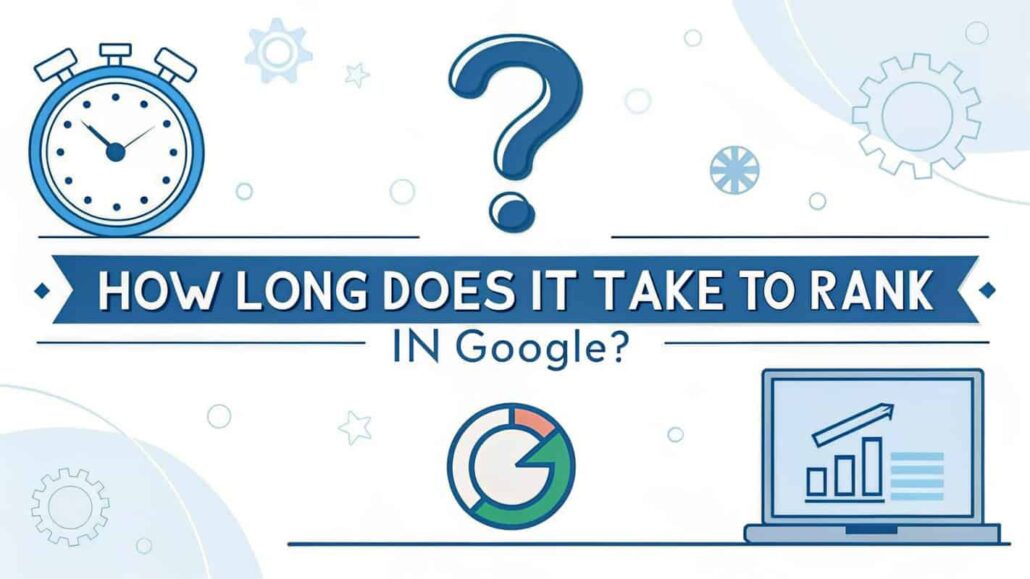
How Long Does It Take to Rank in Google?
If you’ve just launched your website or added fresh content, you’re probably itching to watch those pages climb the Google ladder. But how long does it really take before you snag a spot on the first page? Unfortunately, there’s no simple answer. Times vary because of your niche, how good your content is, and the SEO moves you make.
How Long Does It Take to Rank in Google?
In this post, we’ll break down the factors that influence rankings, share typical timelines for different sites, and offer quick tips to speed things up. By the time you’re done reading, you should have a clearer idea of what it takes to rank on Google and practical steps you can use right away.
Why Should You Care About Ranking?
Before we drill into the timeline, let’s role-play for a second: your brand new blog post goes live. Do you really make time to search for it, or do you refresh Analytics twenty minutes later? Odds are you do both. That same curious habit drives the entire web. Statistics agree. Roughly 68 percent of all online journeys kick off with a search box, while around 75 percent of searchers never scroll past the first page. Higher spots mean bigger audiences and, in turn, more trust and sales.
Factors That Impact How Quickly Your Site Ranks
- Domain Authority
Google naturally leans toward sites it sees as credible and trustworthy. Domain authority is one way analysts gauge that trust level, looking at things such as quality backlinks, site age, and consistent optimization work. A brand-new site with only a handful of mentions will nearly always need more time to show up than an older, well-tended domain.
- New Sites: If you stick with best SEO practices, you might begin to rank in roughly 6 to 12 months for mid-range, competitive keywords.
- Established Sites: A strong domain authority can often push fresh content into view in just a few weeks or, at most, a couple of months.
- Competition for Keywords
Not every word or phrase is equal in terms of the crowd chasing the first-page spots. Search marketers usually label keywords as low, medium, or high competition based on the number of sites already battling to claim and keep those positions.
- Low-Competition Keywords: These can start appearing in search results within 1 to 3 months, sometimes even faster.
- High-Competition Keywords: Fresh domains aiming for popular terms in fields like finance or fashion usually face a longer wait, often around 6 months or more, and sometimes over a year.
3. Quality of Content
Google cares a lot about the quality of what you post. Its algorithms look for articles that really help people learn or solve a problem. To score well, your writing should be original, detailed, easy to read, neatly formatted, and sprinkled with keywords in a natural way.
Quick Tip: Quality beats quantity. One in-depth, well-researched blog is worth more than ten short, flimsy posts.
4. Backlinks and External Signals
Think of backlinks as friendly votes from other websites. The more good sites link to you, the faster Google starts to trust you and push your pages up the results.
Google also notices how often your content is mentioned or shared on social media, adding another layer to its trust score.
- Links from respected domains can supercharge your rankings.
- Building a solid link profile takes time, so stay patient and focus on earning links, not buying them.
5. On-Page and Technical SEO
Even great content can get overlooked if your site runs poorly. On-page elements like title tags, meta descriptions, smart use of headers, and smart keyword placement help guide both users and crawlers.
No less important are technical parts: speedy loading times, mobile-responsive design, and a clear indexing status keep visitors happy and improve rankings.
How Long Does It Usually Take to Rank?
Lets break it down on a realistic time line:
- Quick Wins (1-3 Months): Optimiz ing for easy, low-competition keywords often shows fast gains. If your content speaks directly to searchers needs, it might even pop up in a matter of weeks.
- Mid-Term Gains (3-6 Months): For medium-competition terms or busi nesses in crowded markets, expect several months before you see strong growth. Uplifting your sites domain authority is a big piece of this phase.
- Long-Term Play (6-12 Months or More): New sites trying to rank for tough keywords may wait a year or longer. That same time line applies to fields like health, legal, and finance, where rivals are everywhere.
Can You Speed It Up?
There is no magic button, but these steps can move you up the ladder faster:
- Target Low-Competition Keywords: When you are just getting started, hunt for long-tail phrases that few sites chase, like easy SEO tips for beginners. Because they are 4 to 5 words long, they face way less overlap. Free or low-cost tools like Ubersuggest, SEMrush, and Ahrefs can help you spot them.
2. Create High-Quality, Evergreen Content
Evergreen content stays useful long after it’s published and tends to rank steadily. Think of pieces like detailed how-to guides or simple “what is” explanations. Because they keep pulling in visitors and links, these posts can strengthen your site’s overall authority.
3. Invest in Link Building
A solid backlink plan raises your domain authority more than just good content does:
- Write guest posts for respected blogs in your field.
- Design shareable assets, such as infographics or mini research reports.
- Cultivate friendly partnerships with other niche websites.
4. Optimize for User Experience (UX)
Google loves sites that make visitors feel welcome. To polish your own UX:
- Aim for pages that load in under 3 seconds.
- Guarantee a smooth, responsive layout on phones and tablets.
- Choose simple, readable designs with plenty of white space.
Pro Tip: Check your scores with Google PageSpeed Insights or GTmetrix, then fix what slows you down.
5. Promote Your Content
Distribute each new article on social media, in email blasts, and in community forums. Strong early traffic and interaction tell Google your site deserves a higher rank.
Realistic Expectations for Business Professionals
If you run a small shop, a startup, or even a corporate page, you probably hope your site sells and signs up customers while you sleep. A dependable way to do that is sound SEO. Treat it like watering a plant: do it regularly, and over weeks or months you’ll see buds. Skip a week, though, and growth slows. Yes, the stakes may feel high, but patience plus steady effort really does turn low-traffic spots into organic powerhouses.
Even though results take a while, proving that your work pays off is simple:
- Track keyword changes with tools such as Ubersuggest or Moz.
- Check how many people land on your site and bounce back fast in Google Analytics.
- Scan your list of inbound links every month to spot fresh partners and broken pipes.
Ranking Takes Time, but it’s Worth the Wait
Climbing Googles ranking pages closely resembles training for a race: progress shows up slowly, yet each small win crowds out frustration. If you publish helpful guides, fix broken links, and tweak headlines week after week, visibility inches upward, traffic swells, and conversions follow like loyal ducks behind their mother.
Old websites retooled or brand-new blogs fed with care face the same truth- the journey lasts many seasons, not a week or two. Squeeze new keywords into pages, keep reading industry blogs, and adjust when Google flips its ranking recipe, and you’re practically guaranteed a front-row seat in tomorrows search results.

